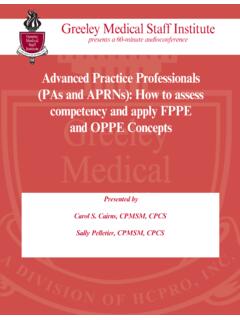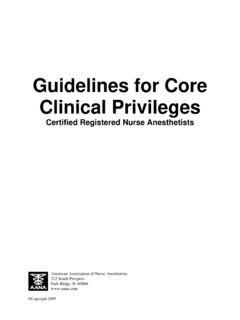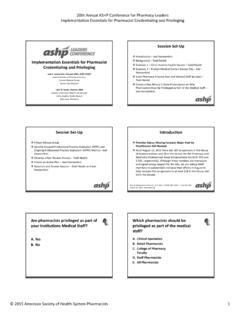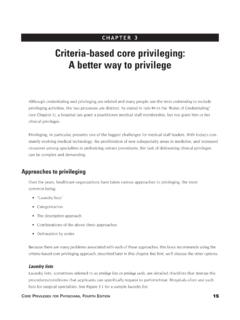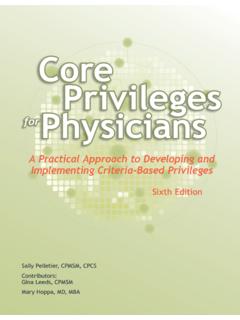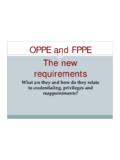Transcription of GUIDELINES FOR CREDENTIALING & MEDICAL PRIVILEGES
1 Universiti Kebangsaan Malaysia N a t i o n a l U n i v e r s i t y o f M a l a y s i a GUIDELINES FOR CREDENTIALING & MEDICAL PRIVILEGES In Universiti Kebangsaan Malaysia MEDICAL Centre (UKMMC) EDITION 2010 GUIDELINES for UKMMC CREDENTIALING & MEDICAL PRIVILEGES CONTENTS Page 1. Purpose 1 2. Background 1 3. General Principles and Definitions 2 4. Introducing A CREDENTIALING System 4 5. Organisational Structure 7 Table I: UKMMC CREDENTIALING & MEDICAL PRIVILEGES Appeals Committee 7 Table II: UKMMC CREDENTIALING & MEDICAL PRIVILEGES Committee 9 Secretariat 11 Departmental Specialty Sub- Committee 11 6.
2 Procedure for Credentials & MEDICAL PRIVILEGES 14 7. Re-Appraisal/ Re- privileging 19 8. Application for Additional Clinical PRIVILEGES 20 9. Monitoring and Review of PRIVILEGES 20 10. Extension of PRIVILEGES 21 11. Termination of PRIVILEGES 21 12. Procedure for Appeals 22 Flowchart 1 : Organisational Structure for CREDENTIALING & MEDICAL PRIVILEGES 25 Flowchart 2: Process for Credentials & MEDICAL PRIVILEGES Appendix: 26 CP Checklist Application for CREDENTIALING 27 CP1 Application for Clinical PRIVILEGES 28 CP2 Application Appraisal for Clinical PRIVILEGES 32 CP3 Reappraisal/ Re- privileging Checklist 35 CP4 Application for Renewal of Clinical PRIVILEGES 36 CP5 Reappraisal by Head Department for Renewal of Clinical PRIVILEGES 41 CP6 Peer Appraisal of MEDICAL Staff Member 42 CP7 Additional Clinical PRIVILEGES Application 45 Proctor Proctoring Evaluation Form 47 Abbreviations.
3 UKMMC - Universiti Kebangsaan Malaysia MEDICAL Centre MOH - Ministry of Health MRCOG - Member of Royal College of Obstetricians & Gynaecologists MRCP - Member of the Royal College of Physicians FRCS FANZCA - Fellow of the Royal College of Surgeons - Fellow of Australian and New Zealand College of Anaesthetists OT CV SMK MMC - Operation Theatre - Curriculum Vitae - Sistem Maklumat Kakitangan - Malaysian MEDICAL Council 1. PURPOSE This document is intended to provide GUIDELINES for UKMMC on the delineation of clinical PRIVILEGES for doctors and other allied health professionals.
4 The GUIDELINES include definitions of the various terms and the procedures for the initial granting, periodic review and updating of clinical PRIVILEGES . 2. BACKGROUND Rapid advances in MEDICAL technology have resulted in the introduction of new procedures and techniques in medicine. Undue haste in applying and performing these techniques without adequate knowledge and training can result in unacceptable outcomes. With an increasingly well-informed and knowledgeable public, it is essential that there is a mechanism for hospitals and MEDICAL centres to ensure that all healthcare providers are competent in each procedure they perform.
5 The delineation of clinical PRIVILEGES has therefore emerged as an important activity of a hospital or MEDICAL centre. The process, which is a major part of any CREDENTIALING system, has also become a useful element of the hospital risk management programme. Even though individual healthcare providers provide services, the hospital is accountable and responsible for all activities, which take place in the premises. The task of delineating PRIVILEGES can be complex and demanding. Hence, this centre needs a system for dealing with the process, which must not only be fair, credible and consistent but also flexible enough to address the constraints especially the shortage of manpower in certain areas.
6 Ideally the process of CREDENTIALING should include the definition and delineation of the role of each MEDICAL personnel in the centre; this process must include both the specialist MEDICAL officers as well as allied health professionals. 3. GENERAL PRINCIPLES AND DEFINITIONS. CREDENTIALING A two-pronged process that involves establishing requirements and evaluating individual qualifications for entry into a particular status/specialty. CREDENTIALING first involves considering and establishing the professional training and experience. The second aspect of CREDENTIALING involves obtaining and evaluating the qualifications of individual applicants.
7 Credentials Credentials represent the formal qualifications, training, experience and clinical competence of the healthcare provider providing the professional health service. They are evidenced by documentation such as university degrees, fellowships of professional colleges or associations, certificates of service, certificates of completion of specifies courses, periods of verifiable formal instruction or supervised training and information contained in confidential professional referee reports. PRIVILEGES The right of a MEDICAL practitioner to provide specific MEDICAL care that is consistent with his/her training, experience and competency.
8 core PRIVILEGES PRIVILEGES that a fully trained, entry-level MEDICAL practitioner is qualified to do in a particularly specialty on completing an approved training programme, for example, Masters programme, MRCOG, MRCP, FRCS and FANZCA. A newly gazetted specialist would be accorded PRIVILEGES covering core PRIVILEGES . Procedures that go beyond the core that would require additional training and/or experience are covered by additional specific PRIVILEGES . Delineation of PRIVILEGES A three-pronged process of determining which diagnostic and treatment procedures a hospital is equipped and staffed to support, the minimum training and experience necessary for a MEDICAL practitioner to competently carry out each procedure and whether the credentials of applicants meet requirements and allow authorization to carry out requested procedures.
9 The clinical PRIVILEGES represent the range and scope of clinical responsibility that a MEDICAL practitioner may exercise in the hospital. Clinical PRIVILEGES are specific to the individual, usually in a single hospital and are not automatically transferable to another. Current Competence A determination of the extent to which a clinician is presently sufficiently skilled to safely execute his or her current PRIVILEGES . A current competence assessment includes evaluating a clinician s training, experience, health, ability to interact with other staff members, clinical outcome statistics, continuing education and other such criteria the hospital may choose to include.
10 Healthcare Provider The term healthcare provider is used in this document as a generic term to reflect all MEDICAL practitioners and allied health professionals. 4. INTRODUCING A CREDENTIALING SYSTEM Recognition Of Specialist Status A MEDICAL practitioner wishing to practice in Malaysia must register with the Malaysian MEDICAL Council. However, this registration does not differentiate a specialist from a general practitioner. In UKMMC, the appointment of a specialist is done after completion of supervised clinical training by the respective consultants, six months for local postgraduate degree and 18 months for foreign postgraduate degree.
